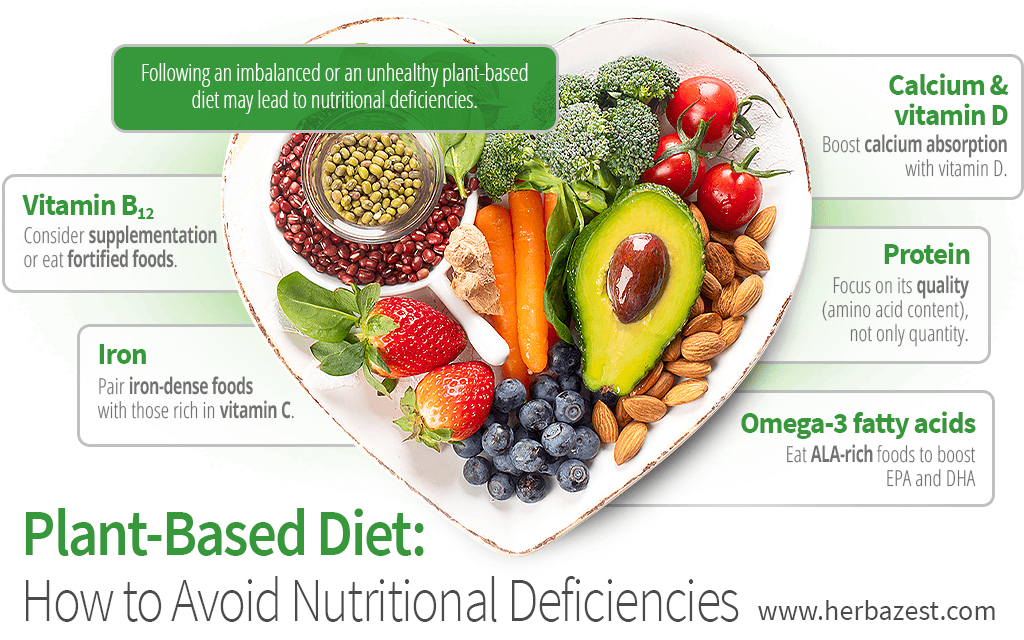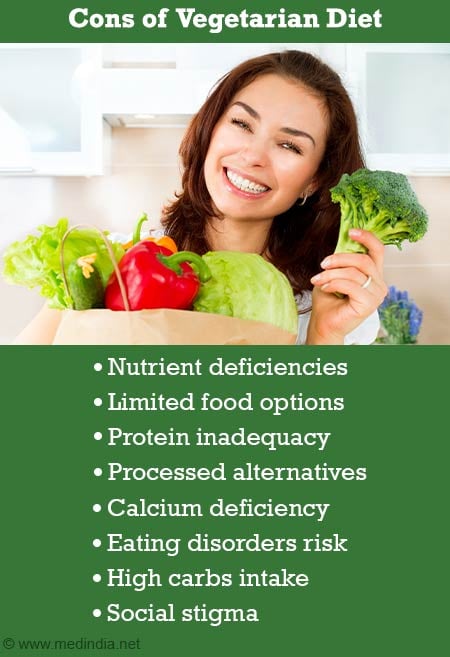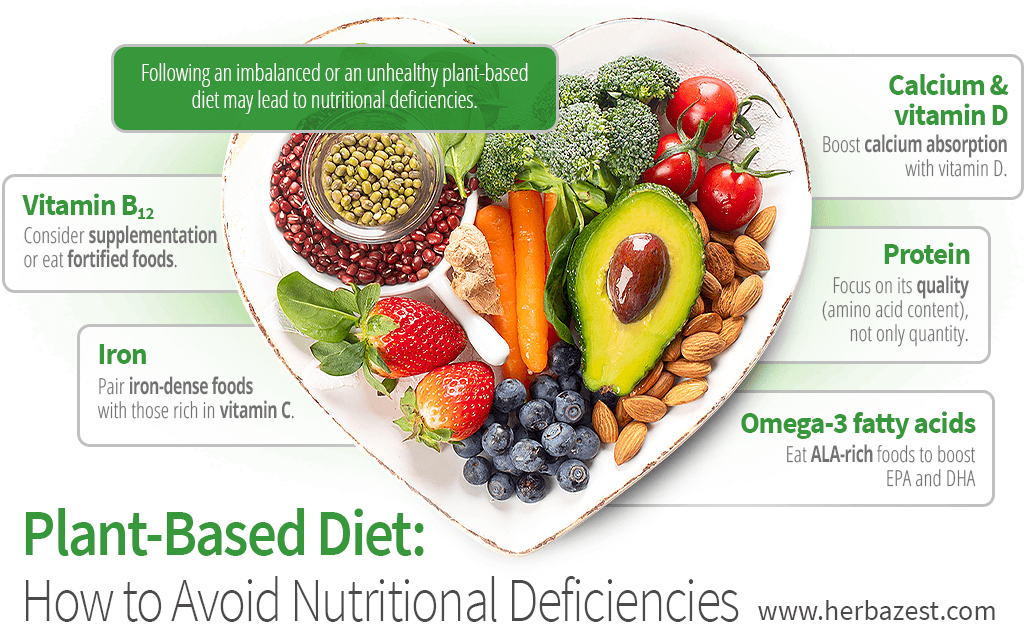Uncover the hidden health risks of vegetarian and Meat-Free Diets that could be silently affecting your well-being.
1. Vitamin B12 Deficiency: The Hidden Epidemic
Vitamin B12 is crucial for nerve function and red blood cell production. Explosive discoveries have shown that vegetarians and vegans are at a higher risk of B12 deficiency, which can lead to anemia, fatigue, and neurological issues. Since B12 is primarily found in animal products, supplementation or fortified foods are essential for those on plant-based diets. Learn more about B12 sources and supplementation.
2. Iron Deficiency: More Than Just Low Energy
Iron is vital for oxygen transport in the blood. While plant-based sources provide non-heme iron, its absorption is less efficient than the heme iron found in meat. Explosive discoveries indicate that vegetarians may need to consume higher amounts of iron-rich foods or consider supplements to prevent deficiency. Read about managing iron intake.
3. Omega-3 Fatty Acids: Essential for Brain and Heart Health
Omega-3 fatty acids, particularly EPA and DHA, are vital for cognitive function and cardiovascular health. Explosive discoveries have revealed that these are primarily found in fish and are less abundant in plant-based foods. Vegetarians and vegans can obtain ALA from flaxseeds and walnuts, but conversion to EPA and DHA is limited. Explore plant-based omega-3 sources.

4. Calcium and Vitamin D: Bone Health Under Siege
Calcium and vitamin D are crucial for bone density and strength. Explosive discoveries have highlighted that vegetarians, especially vegans, may have lower intakes of these nutrients, leading to an increased risk of bone fractures. Fortified plant milks and sunlight exposure are recommended to meet daily requirements. Understand the importance of vitamin D.
5. Zinc: The Immune System’s Ally
Zinc plays a vital role in immune function, protein synthesis, and wound healing. Explosive discoveries indicate that zinc from plant sources is less bioavailable than from animal products, potentially leading to deficiencies in vegetarians and vegans. Learn about zinc deficiency symptoms.
6. Protein Quality: Meeting All Essential Amino Acids
While plant-based diets can provide adequate protein, they may lack one or more essential amino acids. Explosive discoveries have shown that combining different plant proteins can ensure all essential amino acids are consumed. Discover complete plant protein sources.
7. Iodine: Often Overlooked in Plant-Based Diets
Iodine is essential for thyroid function and metabolic regulation. Explosive discoveries have revealed that plant-based diets, especially those excluding dairy and eggs, may lack sufficient iodine, leading to thyroid issues. Sea vegetables like seaweed can be a good source of iodine. Read about iodine deficiency symptoms.
8. Processed Plant-Based Foods: The Hidden Culprits
Not all plant-based foods are healthy. Explosive discoveries have shown that highly processed vegetarian and vegan foods can be high in unhealthy fats, sugars, and sodium, negating the health benefits of a plant-based diet. It’s essential to focus on whole, unprocessed foods for optimal health. Learn about the impact of ultra-processed foods.
Conclusion: Confronting the Silent Killers
While meat-free diets offer numerous health benefits, it’s crucial to be aware of the potential nutrient deficiencies and health risks associated with them. By staying informed and making conscious dietary choices, vegetarians and vegans can mitigate these risks and maintain optimal health. For personalized dietary advice, consult with a registered dietitian or nutritionist.
For more information on vegetarian nutrition and health, visit our Nutrition Hub.
Understanding Anti-Nutrients in Plant-Based Diets
Plant-based foods contain compounds like phytates, oxalates, and lectins that can inhibit mineral absorption. While these anti-nutrients are usually not dangerous in moderate amounts, excessive reliance on certain grains or legumes without proper preparation may limit calcium, iron, and zinc absorption.
Vegetarian Diets and Sleep Quality
Emerging research suggests that low intake of certain nutrients, such as tryptophan, magnesium, and vitamin B6, can impact sleep quality. Meat-free diets that do not include sufficient sources of these nutrients may subtly disrupt sleep patterns over time.
The Effect of Meat-Free Diets on Hormonal Balance
Phytoestrogens found in soy and flaxseed can influence estrogen levels. While moderate intake may be beneficial, excessive consumption without dietary diversity could subtly alter hormonal balance, affecting menstrual cycles or thyroid function in sensitive individuals.
Hidden Sugars in Meat Alternatives
Many commercially processed meat alternatives contain added sugars and sodium. Relying heavily on these products can inadvertently increase sugar intake, elevate blood sugar levels, and reduce the overall nutritional benefits of a meat-free diet.
Digestive Adaptation to High Fiber Intake
Transitioning to a meat-free diet usually increases fiber intake dramatically. While fiber promotes gut health, sudden increases can cause bloating, gas, and irregular bowel movements. Gradual dietary adjustments and adequate hydration are key to avoiding discomfort.
The Role of Gut Microbiota in Vegetarian Health
Meat-free diets can enhance gut microbiome diversity due to high fiber intake, but over-reliance on processed plant foods may reduce microbial diversity. Fermented foods and prebiotic-rich vegetables help maintain a healthy balance of gut bacteria.
Vitamin K2 and Bone Mineralization
While calcium and vitamin D are emphasized in vegetarian diets, vitamin K2 is often overlooked. This nutrient is important for bone mineralization and cardiovascular health. Plant-based sources are limited, so careful dietary planning is required to avoid deficiencies.
Balancing Sodium Intake in Meat-Free Diets
Plant-based diets are generally lower in sodium, but processed vegetarian products and condiments can contribute high sodium levels. Excess sodium intake can negate cardiovascular benefits, so monitoring and choosing minimally processed foods is important.
The Hidden Challenge of Iodine Intake
Iodine is essential for thyroid function, yet many meat-free diets omit common iodine sources like fish and dairy. Seaweed and iodized salt can help meet daily needs, but awareness of iodine intake is often overlooked.
Vegetarian Diets and Athletic Performance
Athletes on meat-free diets need to carefully monitor protein and iron intake to maintain muscle mass and endurance. Explosive discoveries highlight that combining plant proteins ensures all essential amino acids are consumed for optimal performance.
The Impact of Meat-Free Diets on Mental Health
Nutrient deficiencies in B12, omega-3s, and iron can subtly affect mood, focus, and cognitive function. Incorporating fortified foods, algae-based supplements, and diverse plant sources helps support mental well-being.
Seasonal Eating for Optimal Nutrient Diversity
Eating a wide range of seasonal fruits and vegetables ensures maximum nutrient intake and exposure to phytonutrients. Relying on limited or imported produce year-round can reduce the nutritional quality of a vegetarian diet.
Hydration and Electrolyte Balance in Plant-Based Diets
High-fiber vegetarian diets increase water requirements. Inadequate hydration may cause constipation, fatigue, and reduced mineral absorption. Including hydrating foods and maintaining electrolyte balance is essential for long-term health.
Vegetarian Diets and Aging Populations
Older adults following meat-free diets need to monitor calcium, vitamin D, protein, and B12 intake to maintain muscle mass, bone density, and cognitive function. Tailored dietary planning is crucial for healthy aging.
Environmental Considerations of Meat-Free Diets
Meat-free diets reduce greenhouse gas emissions and water usage compared to meat-heavy diets. However, sourcing highly processed plant-based foods or imported produce can partially offset these environmental benefits. Choosing local, seasonal, and minimally processed foods maximizes ecological impact.
The Role of Choline in Meat-Free Diets
Choline is an essential nutrient important for liver function, brain development, and metabolism. Explosive discoveries have revealed that vegetarians and vegans may have lower choline intake because it is primarily found in eggs and meat. Plant-based sources like soybeans, quinoa, and cruciferous vegetables can help, but supplementation may be necessary for optimal cognitive and liver health.

Creatine Levels and Muscle Energy in Plant-Based Diets
Creatine is naturally abundant in meat and helps supply energy to muscles. Explosive discoveries have shown that vegetarians may have lower creatine stores, potentially affecting high-intensity exercise performance. While the body can synthesize creatine, supplementation can enhance muscle strength, endurance, and recovery for those on long-term meat-free diets.
The Hidden Impact of Soy Overconsumption
Soy is a staple in many meat-free diets, but excessive consumption can interfere with thyroid function in sensitive individuals due to goitrogens. Explosive discoveries highlight that moderation and diversity of protein sources, combined with adequate iodine intake, help prevent negative effects while still benefiting from soy’s heart-healthy properties.
Vitamin A: Ensuring Adequate Retinol Levels
While plant-based foods provide beta-carotene, the conversion to active vitamin A (retinol) is inefficient in some individuals. Explosive discoveries indicate that long-term reliance on beta-carotene alone may lead to suboptimal vitamin A levels, affecting vision, immunity, and skin health. Including a variety of colorful vegetables and fortified foods can help meet daily requirements.
Vegetarian Diets and Blood Lipid Profiles
Explosive discoveries have shown that meat-free diets can lower LDL cholesterol and triglyceride levels, reducing the risk of cardiovascular disease. However, relying heavily on refined grains, oils, and processed plant-based snacks may counteract these benefits, highlighting the importance of whole, nutrient-dense foods.
The Connection Between Meat-Free Diets and Hormonal Health in Men
Testosterone and other hormones may be subtly influenced by nutrient intake in meat-free diets. Explosive discoveries suggest that zinc and vitamin D deficiencies can affect hormonal balance, potentially influencing energy levels and reproductive health. Strategic inclusion of fortified foods and nuts or supplementation is recommended.
Long-Term Bone Health Risks and Plant-Based Nutrition
Explosive discoveries indicate that vegetarians and vegans may have lower bone mineral density due to limited intake of calcium, vitamin D, and vitamin K2. Incorporating fortified plant milks, leafy greens, nuts, and regular weight-bearing exercise can mitigate these risks and support strong skeletal health over time.
The Importance of Selenium in Meat-Free Diets
Selenium is crucial for thyroid function and antioxidant defense. Explosive discoveries have highlighted that selenium intake can be low in meat-free diets, particularly in regions with selenium-deficient soils. Brazil nuts, mushrooms, and whole grains are excellent sources to prevent deficiency and maintain immune and thyroid health.
The Effect of Plant-Based Diets on Gut-Derived Short-Chain Fatty Acids
High-fiber meat-free diets enhance the production of short-chain fatty acids (SCFAs) in the gut, which support intestinal health, regulate inflammation, and improve glucose metabolism. Explosive discoveries emphasize that insufficient variety in plant foods can limit SCFA production, reducing these benefits.
The Hidden Sodium Sources in Plant-Based Condiments
While natural plant foods are low in sodium, many meat-free condiments, sauces, and meat alternatives contain hidden sodium. Explosive discoveries reveal that overconsumption can increase blood pressure and reduce cardiovascular benefits, stressing the need for careful label reading and homemade alternatives.
Vitamin B6 and Neurotransmitter Synthesis in Vegetarians
Vitamin B6 is vital for neurotransmitter synthesis, including serotonin and dopamine. Explosive discoveries indicate that low B6 intake from unbalanced meat-free diets can subtly affect mood, sleep, and cognitive performance. Including fortified cereals, potatoes, bananas, and chickpeas ensures adequate intake.
Maintaining Electrolyte Balance on High-Fiber Diets
Meat-free diets are often high in fiber, which can increase the demand for electrolytes like potassium, magnesium, and sodium. Explosive discoveries suggest that neglecting electrolyte balance may lead to fatigue, cramps, and impaired muscle function, especially in active individuals. Balanced hydration and mineral-rich plant foods are essential.
Plant-Based Diets and Cardiometabolic Health
Explosive discoveries highlight that meat-free diets can reduce insulin resistance, lower cholesterol, and improve metabolic profiles. However, diets dominated by processed vegetarian foods may not confer the same benefits. Emphasizing whole grains, legumes, vegetables, and nuts ensures optimal cardiometabolic health.
The Role of Polyphenols in Meat-Free Diets
Polyphenols in fruits, vegetables, tea, and legumes have antioxidant and anti-inflammatory properties. Explosive discoveries demonstrate that a lack of dietary variety can limit polyphenol intake, reducing protection against oxidative stress and chronic disease. Diverse plant foods are essential for harnessing these benefits.
Impact of Meat-Free Diets on Pregnancy and Fetal Development
Explosive discoveries show that inadequate intake of B12, iron, iodine, and DHA in meat-free diets can affect maternal health and fetal development. Careful dietary planning, including fortified foods and appropriate supplementation, ensures healthy pregnancy outcomes while maintaining a plant-based lifestyle.
Frequently Asked Questions About Meat-Free Diets
What are the main health benefits of meat-free diets?
Meat-free diets are associated with lower risks of heart disease, high blood pressure, obesity, and certain types of cancer due to their high content of fiber, antioxidants, and phytonutrients.
Can meat-free diets provide enough protein?
Yes, by including a variety of legumes, nuts, seeds, tofu, tempeh, and whole grains, meat-free diets can meet daily protein requirements effectively.
Do meat-free diets cause vitamin B12 deficiency?
Since vitamin B12 is primarily found in animal products, people on meat-free diets should consider fortified foods or supplements to prevent deficiency and maintain nerve and blood health.
How do meat-free diets affect iron intake?
Plant-based sources provide non-heme iron, which is less efficiently absorbed. Pairing iron-rich foods with vitamin C-rich foods improves absorption and prevents anemia in meat-free diets.
Are omega-3 fatty acids sufficient in meat-free diets?
Vegetarians can obtain ALA from flaxseeds, chia seeds, walnuts, and hemp seeds. Conversion to EPA and DHA is limited, so algae-based supplements may be considered for optimal heart and brain health.
Do meat-free diets help with weight management?
Yes, meat-free diets are often high in fiber and low in calorie density, which promotes satiety and helps maintain a healthy weight when combined with balanced eating.
Can meat-free diets reduce the risk of cardiovascular diseases?
Yes, explosive discoveries show that diets rich in whole plant foods improve cholesterol levels, lower blood pressure, and reduce the risk of heart disease.
How can vegetarians prevent calcium deficiencies?
Plant-based calcium sources include fortified plant milks, leafy greens, almonds, and tofu. Ensuring adequate intake supports bone health and reduces the risk of osteoporosis.
Are meat-free diets suitable for children?
Yes, but careful planning is needed to provide sufficient protein, iron, calcium, B12, and other essential nutrients to support growth and development.
Do meat-free diets impact cognitive function?
Insufficient intake of B12, iron, and omega-3s can affect cognitive health. Supplementation and diverse plant sources help maintain brain function in meat-free diets.
How do meat-free diets influence gut health?
High fiber from fruits, vegetables, legumes, and whole grains promotes a diverse and healthy gut microbiome, improving digestion, immunity, and metabolic health.

Can meat-free diets be sustainable for athletes?
Yes, with careful planning to meet protein, iron, and caloric needs, athletes on meat-free diets can maintain endurance, strength, and recovery effectively.
What are the environmental benefits of meat-free diets?
Meat-free diets reduce greenhouse gas emissions, water usage, and land consumption, making them more environmentally sustainable compared to meat-heavy diets.
How do meat-free diets affect cholesterol levels?
Explosive discoveries show that plant-based diets lower LDL cholesterol and improve heart health when focused on whole, unprocessed foods.
Do meat-free diets require supplements?
Depending on the individual, B12, vitamin D, omega-3, iron, or iodine supplements may be necessary to prevent deficiencies while following a meat-free diet.
Are meat-free diets suitable during pregnancy?
Yes, with proper planning to ensure adequate intake of protein, iron, B12, calcium, iodine, and DHA for fetal development and maternal health.
Can meat-free diets help with inflammation?
Yes, diets rich in fruits, vegetables, nuts, seeds, and whole grains are naturally anti-inflammatory and may reduce chronic disease risk.
How do meat-free diets affect sleep quality?
Low intake of tryptophan, magnesium, and B6 may subtly influence sleep. Including diverse plant foods and fortified options supports better sleep patterns.
Do meat-free diets influence hormone levels?
Phytoestrogens from soy and flax can impact estrogen levels. Moderate and balanced intake ensures hormonal benefits without disruption.
Are meat-free diets suitable for older adults?
Yes, older adults need to ensure sufficient intake of protein, B12, calcium, and vitamin D to maintain muscle mass, bone density, and cognitive function on meat-free diets.
Can meat-free diets be enjoyable and diverse?
Absolutely! A wide variety of grains, legumes, vegetables, fruits, nuts, seeds, and herbs can create flavorful and satisfying meals while meeting nutritional needs.





